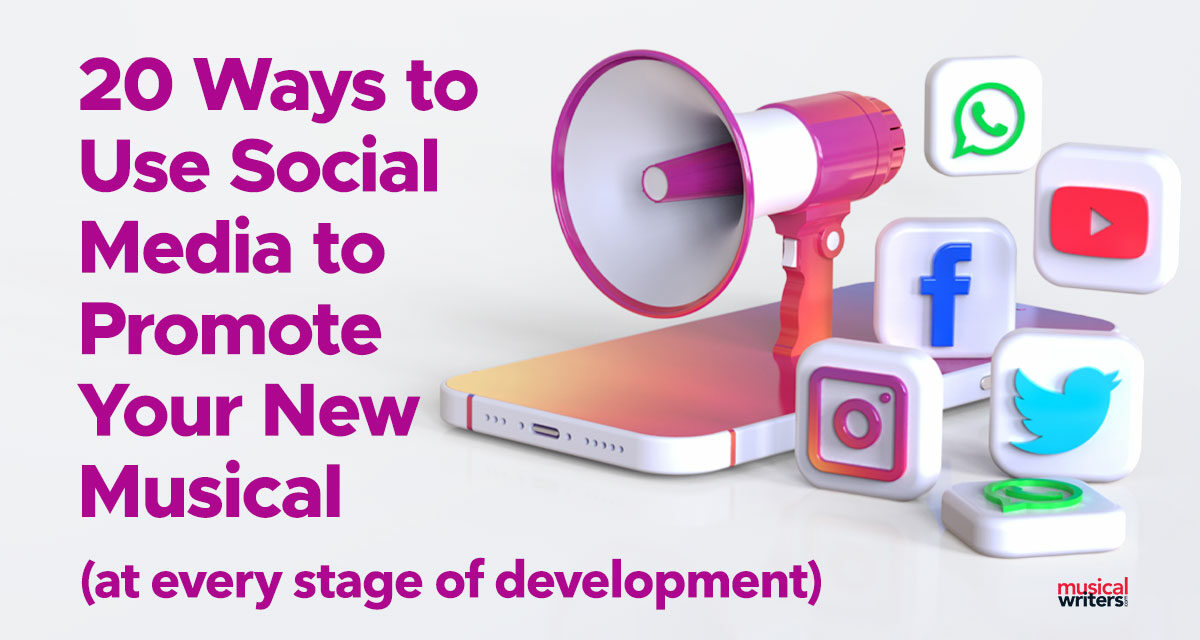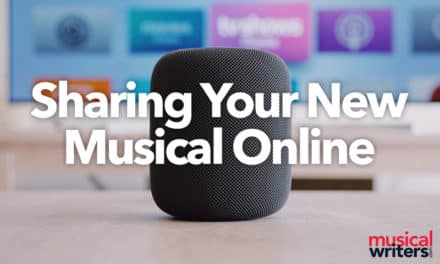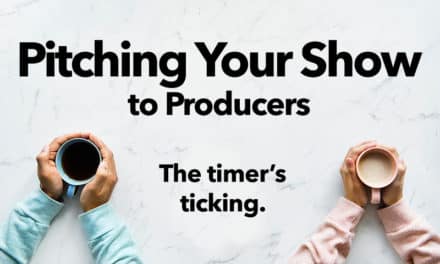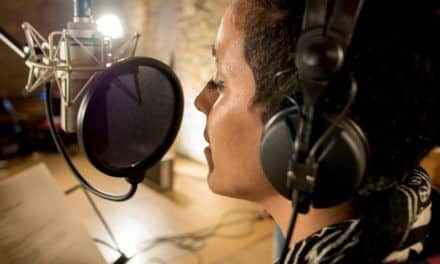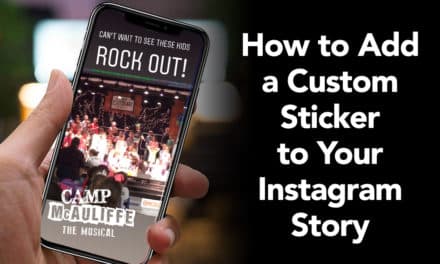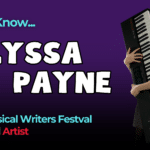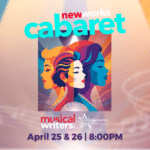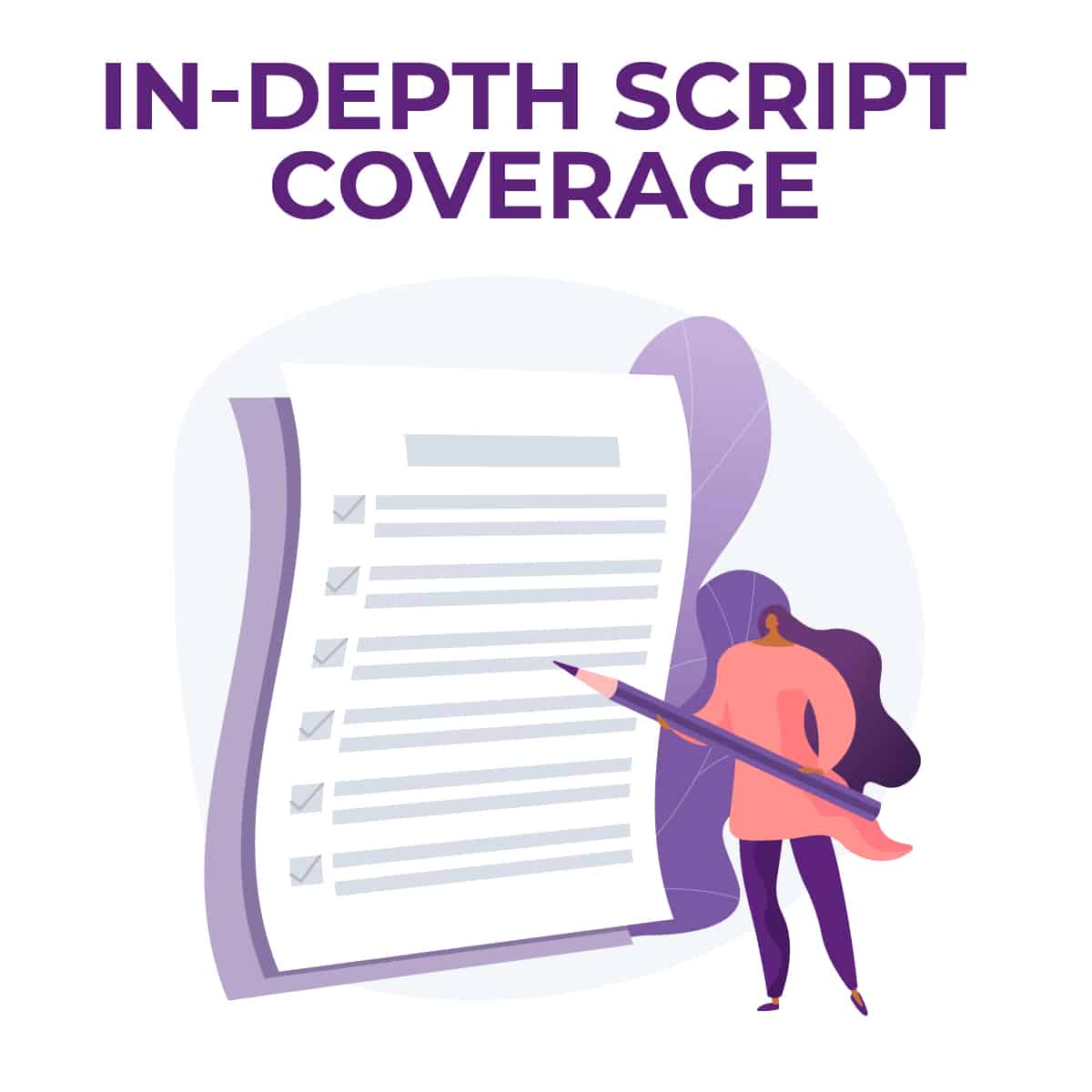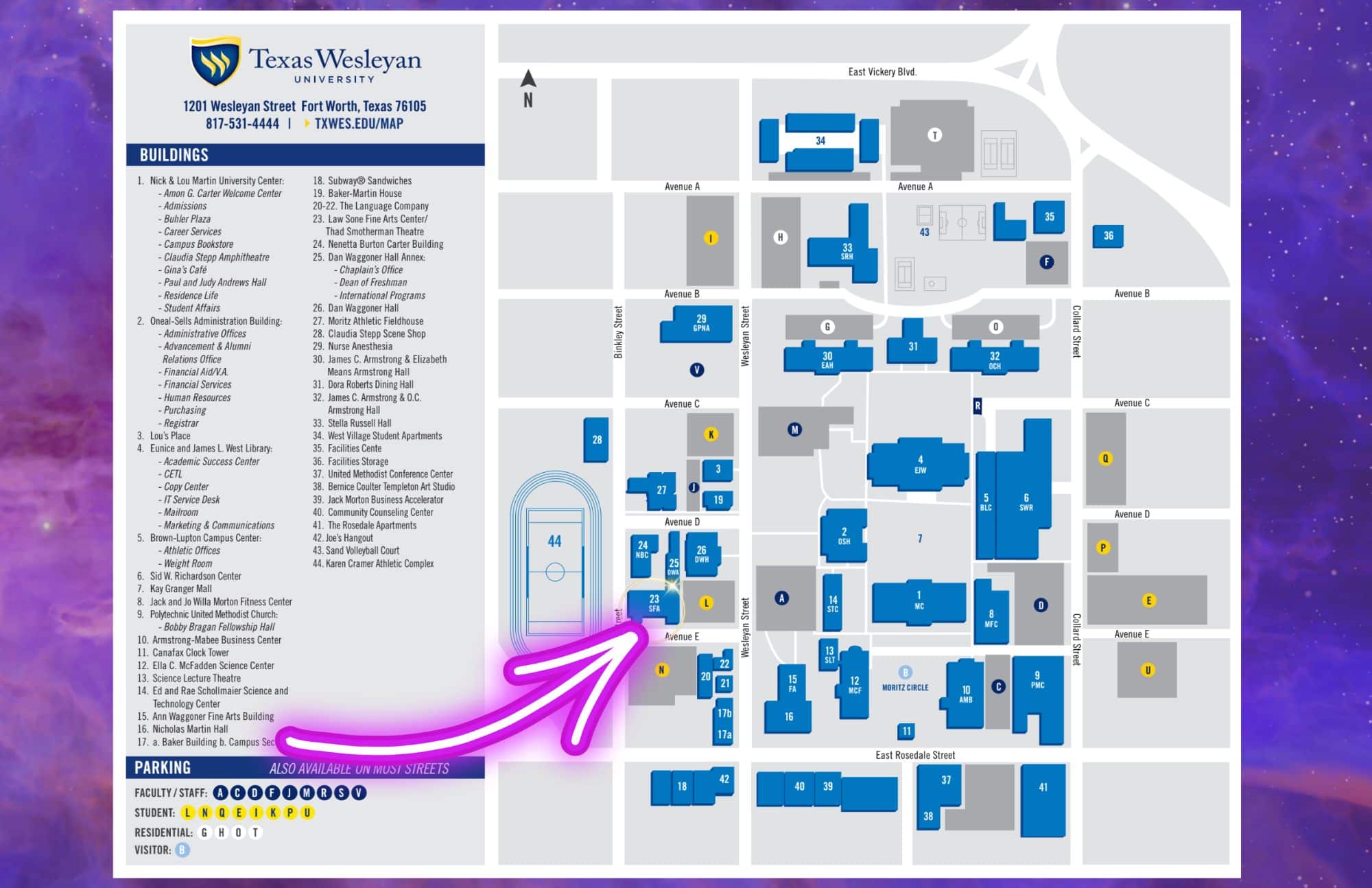For most musical writers, “social media marketing” for your creative projects can feel intimidating. And it usually results in more questions than answers: How do you best use social media to promote your new musical? What are you supposed to post on social? When should you post it? When should you create a show-specific page on social media? Should you hire a marketing agency?
Keep reading for 20 actionable ways you can use social media to promote your musicals, at every stage of development. Whether you’re a musical writer just getting started on a new show, or you have a finished product headed into production, we have specific tips for you!
Using Social Media to Promote Your New Musical… Before You Have a Production to Promote
Just getting started? Maybe you’re working on the first draft of a new show, or just kicking around ideas? You can still start leveraging the power of social media when in the early pre-development phase of the musical writing process.
Here are some of our favorite ways to do just that.
1. Research
As you scroll through social media start getting in the habit of stealing. Keep a running list somewhere of ideas, trending sounds, hashtags, and other inspiration that you may want to use later on. (Most social media sites have a “Save” option that you can use. Or, just compile a list of inspirational posts in your email in a folder, Pinterest Board, digital note taking system, Google Doc, etc.) Then later, when you are ready to promote your project, you’ll have a vault of ideas to reference.
2. Musical Hashtags
Find and follow hashtags on social media that relate to you, new musicals, or the topic of your show. Here are a few specific hashtags that were mentioned during our recent Social Media Bootcamp to get you started:
- #womenwrittenmusical
- #feministmusic
- #newmusicals
- #slimetutorial (if you know, you know)
- #musicalwriters
3. Share a Service
If you don’t yet have anything to share about a particular project, consider sharing more general, but helpful content. Maybe, song recommendations, or day in the life posts (especially for things that pertain to a show you may want to eventually publicize)? This type of content keeps your account on people’s feeds. This means that when you do have something to promote later on, the algorithm will actually show it to your audience.
Sharing a service also helps build up your reputation on social media as a reliable source of knowledge and help. So then, when you share your own work, your audience will be more apt to pay attention and trust your recommendation.
4. Sh*tty First Drafts
Don’t hesitate to share something (a song, performance, logo), just because you suspect it might change down the road. Take your audience along on your development journey, so they can see your project change and evolve!
5. Backstory
Share how you came up with the idea for a current or potential project. Where did you find your inspiration? How does this show relate to your life? What is your WHY for working on this show? The human brain is wired to engage with stories and narratives; by sharing the backstory for your musical project on social media, you’ll be more likely to draw and keep your audience’s attention.
6. (Optional) Create a Show-Specific Page
You CAN start social media accounts for a new work-in-progress as soon as you have artwork to put as your profile picture (created on Canva, etc.). However, you should make sure to share those accounts and your updates on your PERSONAL PAGES as well, so that your friends and family can follow and share. You will definitely be relying on your personal account for a while to share until your musical account gains traction. (Also know that it’s totally fine to just post project updates from your personal account, even once the show is in production!)
Using Social Media to Promote Your New Musical When Submitting and Pitching
Ok, so you have a completed, or nearly-completed show. You’re ready to start sending it out into the world. This is the point in the new musical development process when having a more deliberate social media strategy becomes really important.
Here are a few ways you can use social media to promote your show while submitting and pitching
7. Meeting Producers’ Expectations
When you are submitting a show for production, you should try to have the following available and linked to a social media account, for a potential producer to find:
- A keyword-loaded “log line” that succinctly sums up your show and gets your ideal audience excited and curious about it
- A social account that can be tagged by your team or production partners (either your personal or a show-specific account)
- A landing page or website that can have your basic show information (this can be simple Wix or Squarespace page)
- A “link in bio” page so on your social profiles so that potential followers can sign up for email updates
- A title treatment or key art (logo) for your show that gives an at-a-glance idea for what your show is about
8. #newhashtag for your New Musical on Social Media
Create and use a specific hashtag for your show, and utilize a few popular hashtags in your posts as well. Especially if you are using your personal social media account to share about your musical project, the use of a specific hashtag can make it easier for others to share and learn about your show. For example, check out these hashtags on your favorite social media platform:
- #hamiltonmusical
- #heathers
- #bemorechill
9. Found Footage
Record casual behind-the-scenes footage of your work as much as possible – when creating alone, working with performers, doing read-throughs, etc. Then use this footage as raw material for social media posts and videos.
“Just have a camera on, and if something happens, it happens,” says musical writer Anna Denoia (during our recent Social Media Bootcamp)
10. Social Media Tagging
When you post about your show or your work, tag anyone and everyone who might be relevant or interested (within reason, of course). On most social media sites this is done by typing the “@” symbol into the caption of your post, starting to type the “handle” of the person or place you want to tag, and then selecting their name when it pops up. You can tag your cast members (or your dream cast!), the venue where your show is being produced (or your dream venue).
Most importantly, tag @musicalwriters so that we can help you get more eyeballs on your work!
11. Short Clips
If you are using Equity actors, you cannot legally share a video of your entire show on social media. Even with non-union actors, you probably only want to post smaller chunks from your full recordings onto your social accounts. These short videos can be easily repurposed on YouTube, TikTok, Instagram, and Pinterest… and they often help drum up interest in your show better than full recordings.
“The best thing you can do is leave a producer wanting more,” JJ Malley, featured Boot Camp presenter.
12. Give Them What They Want
If you start to get traction on a social media platform, listen to your audience’s comments and feedback, and be responsive to what they want to see from you next. Whether that’s putting your songs up on streaming services or publishing sheet music, people will be even more engaged if they can see that you are listening and responding to your audience.
Using Social Media to Promote Your New Musical When You Have a Scheduled Reading or Production
You got a reading scheduled… now what? (First of all: CELEBRATE!) At this point, you will really want to lean into social media and other forms of marketing to drum up interest and attendance for your show. Here are a few ideas and tips we recommend at this stage specifically: (You will definitely want to reference the tips in earlier sections of this article as well).
13. Landing Page
At this point, if you do not have a social media account and website to point people towards for your show, you NEED one. This should include basic “branding” for your show that includes a title treatment, tag line, color scheme, synopsis, and basic iconography. While you could use your personal social account for this, if you have a full production scheduled, it’s probably best to use a social media page dedicated to your show.
(We recommend our MusicalWriters CEO Holly Reed for all things design, especially key art, pitch decks and websites. She also has a session on our Social Media Bootcamp.
14. Call in a Ringer
If you do not feel comfortable posting to social media yourself, consider recruiting a member of your cast or crew to spearhead your social media presence.
15. B-Roll
Take real footage of rehearsals, sing throughs, and performances, and use clips from those videos as raw materials in your social media. You can also grab short video clips or images of your performance venue, close ups of your costumes or scripts, or video of yourself working or collaborating. Audiences love to see these kind of “behind the scenes” clips. They can also make easy backgrounds for text-based posts. Or try cutting them together into a highlight real.
16. Musical-Topic-Specific Posts
Think about using hashtags or tagging accounts related to your show’s subject matter. (Rather than just tagging accounts and hashtags that are already in the musical theatre world.) Ex: if your show is about Frida Kahlo, consider what posts, hashtags, and tags might attract Frida Kahlo fans who are not traditional musical theater fans. This will expand your reach on social media to an audience that could be very eager to learn about your work (even though they are not interested in musicals in general).
17. Eye-Catching Announcement Posts
Perhaps you have a big announcement that you want your audience to refer back to (perhaps for online auditions, or an upcoming production). If so, make sure there’s a very obvious post on your feed that is eye-catching and contains all the details in the caption. It should include relevant details and very clear directions on next steps for someone who wants to learn more.
18. Show, Don’t Sell
If you have a production scheduled for your musical, make sure that you are using social media to share more than just “here is my show and where and when it is.” Share all the behind-the-scenes, relatable, and narrative content you can. (Check out earlier tips in this article) This gives people a reason to follow, like, and pay attention to what you have to say. Give them things to be curious about!
19. Great (and accurate) Expectations
Use social media to set expectations for your audience before they come to your show, so that they aren’t unpleasantly surprised with the musical performance experience in some way. This is especially important if your show is tailored specifically to kids (or NOT TO KIDS), or if there is subject matter that might be divisive or controversial.
Using Social Media to Promote Your New Musical When You Have a Commercial Production Scheduled
You’ve made it to the big time! Your show is receiving a professional production, and is poised to make a profit. Now what?!
20. Run the Numbers
At this point, you may want to seriously consider paying a company or freelancer to do social media marketing for your show. But do make sure you have a commercial performance scheduled before you hire a social media agency. (Think about how much money you can make before you start spending lots of money). A good agency will help you determine if and when you should start working with them, based on if they think it is worth the financial investment at this point in your show’s development.
Here are a few agencies that we recommend – especially because they had “guest star” spots at our recent Social Media for Musical Writers Boot Camp!
- Incontrera Consulting https://www.incontrera.com/
- Table 7 Strategy – https://www.table7strategy.com/
Got More Questions About Using Social Media to Promote Your New Musical?
If you’re looking for a deeper dive into all things social media and musical marketing, you may want to check out our Social Media Bootcamp recordings. In this 4-part video workshop, you’ll hear from a variety of industry experts on marketing musicals via social media. You’ll also have access to a series of daily prompts you can use to level up your social media game in one month or less. Click HERE for more information!

